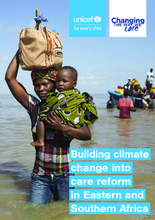Climate change involves rising global temperatures as a result of greenhouse gas emissions, primarily caused by the burning of fossil fuels. Evidence shows that climate change is influencing weather patterns across the world, including in Eastern and Southern Africa, negatively affecting household livelihoods and exposing families to climate-related emergencies, such as floods, droughts and heatwaves. As access to key resources diminishes, climate change is also exacerbating conflict and tensions. This situation will deteriorate further in the years and decades to come, with a fundamental impact on all aspects of child wellbeing, including children’s protection and care. Care reform refers to efforts to improve national care systems, which includes the legal and policy framework, structures and resources that determine and deliver alternative care for children, prevent family separation and support families to care for children. Care reform is vital for ensuring that children can grow up safe and protected within families and not in harmful institutional care. Care reform is a thematic priority in UNICEF’s global child protection strategy.
This paper argues that climate change is the greatest current and future threat to children’s care in the Eastern and Southern Africa region. Responding to this threat requires urgent coordinated action related to care reform policies and interventions and climate change responses.
The paper begins with a description of climate change in the Eastern and Southern Africa region, followed by an analysis of its impacts on families, children’s care and the care system. It then suggests how the risks to children’s care associated with climate change can be mitigated through changes to the care system and to climate change adaptation plans.
Related Webinar:

